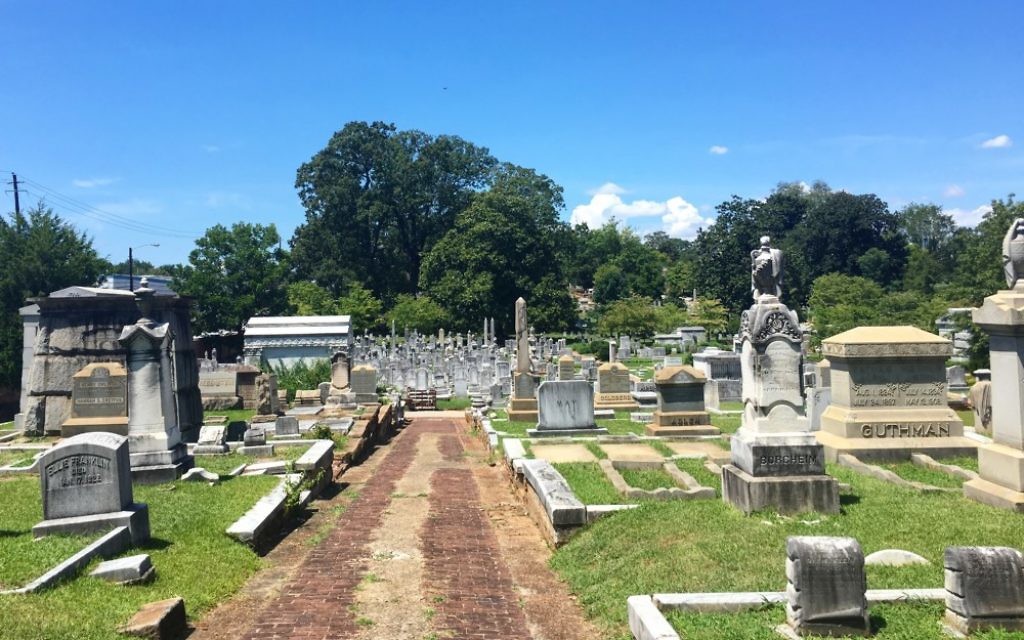$300K Grant to Help Restore Jewish Burial Ground

One of the oldest Jewish burial grounds in Georgia will be restored the next three years, thanks to a $300,000 grant from the Rich Foundation.
The work at the Jewish Hill section of Oakland Cemetery, Atlanta’s original municipal cemetery, will include hardscape, landscaping, repair and cleaning of grave markers, and interpretive signage and other educational materials, said Neale Nickels, the director of preservation for the Historic Oakland Foundation.
The 1.5-acre Jewish Hill is one of three sections purchased by what is now The Temple in the 19th century. HOF has restored the Old Jewish Burial Grounds, dating to the 1850s as part of the original 6 acres of Oakland Cemetery, and Jewish Flats, 1.5 acres purchased at the same time as Jewish Hill in the 1870s as the cemetery expanded to 48 acres. Ahavath Achim Synagogue owns and maintains a separate section in Oakland Cemetery.
Get The AJT Newsletter by email and never miss our top stories Free Sign Up
The Rich Foundation contributed $65,000 to the Jewish Flats work in 2014 and $50,000 for Jewish burial restoration efforts in 2012.
“The trustees of the Rich Foundation believe the restoration of Oakland Cemetery’s Jewish Hill is significant because those interred in the area played an important role in Atlanta’s early history,” foundation President Tom Asher said in a statement. The foundation is delivering the grant over three years.
Among the approximately 500 graves in Jewish Hill are members of the Rich family, who founded Rich’s Department Store; Joseph Jacobs, who owned the pharmacy that served the first Coca-Cola; Jacob Elsas, the owner of Fulton Bag and Cotton Mills; and various Montags, Seligs, Massells and Haases. Nickels said it appears that most of the Jewish Hill burials occurred around the 1940s.
Because of the uneven terrain and the effects of gravity, Jewish Hill offers more challenges and requires more work than Jewish Flats, Nickels said. Falling walls, for example, must be leveled and rebuilt in a painstaking way to ensure that every brick winds up in its original position, secured by historically accurate mortar. The plants used in landscaping must be appropriate to the time of the burial and the means and tastes of the families, based on old photos, letters and other records.
Nickels and his staff are using a triage process to prioritize the work, whose $450,000 budget requires raising $150,000 from the community to supplement the Rich Foundation grant.
“The great thing is that Atlanta has a strong Jewish community. We’ve had a lot of interest so far from the various congregations,” Nickels said. “People are very interested in helping out with this project.”
You can donate through www.oaklandcemetery.com (select “Jewish Section” in the special designation drop-down menu), mail a check (note Jewish Hill in the memo) or contribute at the cemetery visitors center.
Oakland Cemetery, whose Jewish graves are second in age in Georgia only to Savannah’s Bonaventure Cemetery, gets 45,000 to 50,000 visitors for tours, history programs and other special events, in addition to those who use the space as a public park, Nickels estimated. The foundation plans to launch a mobile app for visitors this fall.
“We want to get more and more people interested in Jewish history in Atlanta,” Nickels said.




comments